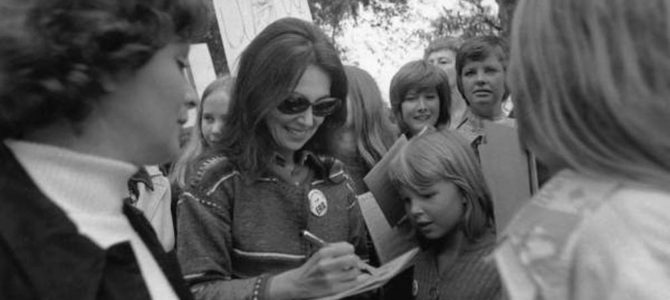
Music important to your past has a way of finding your present. Feeling suddenly nostalgic recently, I told my daughters I’d play them one of my favorite childhood records. So, with Spotify’s help, I streamed “Free to Be…You and Me,” an album I haven’t heard in 30 years.
The album came out in 1972 as a collaboration between actress Marlo Thomas and a bevy of celebrities, for the purpose of encouraging gender neutrality and tolerance. It sounds very progressive, and it was, yet I marveled at its content. This kids’ album is so very political, and much of its revolutionary message sounds old-fashioned, even reactionary — a mere four decades after its debut.
That isn’t how I remembered it, of course. I vaguely recalled songs that made me want to dance, comedic skits, and “William Wants a Doll.” My gal pals and I enjoyed singing about William in the ‘80s. There was even a rendition at a day camp talent show. Given that we didn’t know boys who played with dolls, I suppose our singing felt rebellious.
Of course, it wouldn’t be today. Liberal parents I know are eager to buy dolls for their young sons. And the most traditional parents I know aren’t all that different. They’re comfortable with their sons playing with dolls, even as they recognize their sons typically play don’t Family (as my daughters do constantly) without an instigating girl.
But it wasn’t so much that. It was the rest of it, particularly the thematic thread of sex differences that pervades the album. This album has a strong message about the equality of men and women that must’ve sounded groundbreaking in 1972. There’s also discussion of (heterosexual) marriage and a huge emphasis on boys growing up to be men (and fathers) and girls growing up to women (and mothers) that struck me as a contemporary listener.
Our Culture Has Changed So Fast
In the span of history, 45 years is a blink. Yet, in that short time, social norms have changed so completely that what was radical in 1972 more closely approximates the cultural right than the cultural left in 2017. It’s not a perfect match, especially if we consider the parable of the girl who is eaten by a tiger after repeatedly saying, “Ladies first!” but the shift is perceptible.
Consider the story of Atalanta, the princess with the old-fashioned father, who isn’t sure she wants to wed. It’s not that Atalanta thinks of marriage as a useless piece of paper, as it is sometimes derisively described today, or that she considers it independent of parenthood. Rather, Atalanta wants to travel the world, while preserving the option of marrying Young John later. Between Young John sounding like best friend material, and Atalanta’s desire to postpone marriage, she sounds like a fairly typical twenty-first-century college graduate.
There’s also a Carol Channing monologue about the drudgery of housework, and why women advertising detergent on TV smile, unlike parents cleaning at home. The punchline is that little boys and girls are urged to remember that they’ll hate housework just like their parents, and when they grow up, they should do it together. The monologue not only makes heterosexual-oriented assumptions a similar skit likely wouldn’t today, but it also makes marriage-oriented assumptions that sound dated.
Marriage was still widespread up and down the socio-economic ladder in ye olde 1972. Today, however, marriage remains widespread only among college graduates, and promoting marriage, especially pre-children, has become a conservative public policy goal. (Of course, support for marriage and families exists among liberals too.) But the decline of marriage has inspired a whole cottage industry of wonkery — family studies — wherein liberals and conservatives debate the causes and potential solutions to a society-wide problem that barely even existed 45 years ago.
Then There’s the Vexing Problem of Sex Differences
Perhaps more vexing to those on the Left might be the album’s constant references to boys and girls as two clear categories of people, which presumably leaves no room for gender fluidity. There is also an underlying insistence on biologically based sex differences.
After the upbeat theme song opens “Free To Be…You and Me,” there’s a comedic dialogue between Mel Brooks and Thomas. They play newborns trying to decipher who is the boy, and who is the girl. The duo runs through various stereotypes, like Brooks’ baby being terrified of mice and wanting to become a cocktail waitress, while Thomas’ baby wants to become a fireman (note, not a “firefighter”).
How do they settle their disagreement? They observe their bodies when the nurse comes to change their diapers in the hospital nursery. Their sex differences are not treated as negotiable or social constructs. They are presented as facts.
Similarly, in the song “Parents Are People,” we learn that both mommies and daddies are people, and that they can all be just about anything they want to be. Only two exceptions are mentioned for each side: women can’t be fathers or grandfathers, and men can’t be mothers or grandmothers. Thought experiment: If Thomas and her liberal performative collaborators had traveled to our era and met Caitlyn Jenner, would they have sung the same thing? I’m not so sure. These exceptions constituted a playful, plain vanilla comment in 1972. Today, they’re controversial.
It shows how much the battleground has shifted in the culture wars. Yes, conservatives point to biology as definitive proof of sex differences. But we’ve also accepted previously progressive notions like marriage being a love match of equals, women working outside their homes, and wide parameters for living as both men and women. It makes you wonder what the world will look like in another 45 years. Will we even recognize it?








